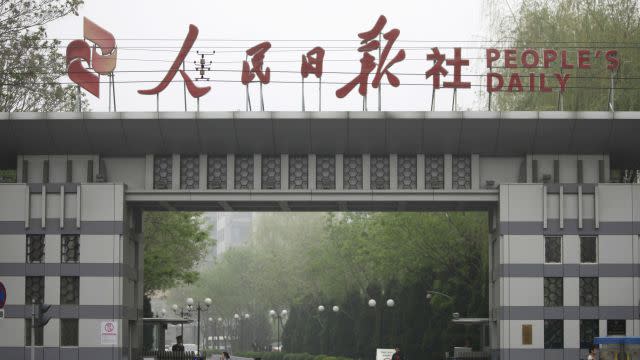China’s censors are cracking down on the Party’s main mouthpiece, the People’s Daily

The People’s Daily newspaper, the leading mouthpiece of China’s Communist Party, almost always trumpets the government’s official policies and ideologies. But now two of its top leaders have been detained by authorities.
The official announcement (link in Chinese) said the two detainees were suspected to have taken bribes. But some speculated that posting a pollution-focused documentary critical of Beijing called Under the Dome—on the paper’s website—might have been a factor.
Both leaders held high positions at the paper’s website, People.cn. President Liao Hong, 52, has been at the company for nearly two decades and was a founding member of People.cn in 1997. Chen Zhixia, 44, serves as vice president of the website.
Both were taken away by prosecutors early on Thursday (Aug. 27), according to Chinese media reports that have since been deleted (here’s an archived copy of one of these articles), including one by Caixin, a respected financial news site.
Liao was president and editor-in-chief of the website, until he was removed in April from the editor-in-chief role, reportedly (link in Chinese) for posting the documentary.
The documentary blames the government for the country’s pollution crisis, and has led to a lot of discussion in China. Produced by a former reporter of national broadcaster CCTV, it was first released in late February on People.cn, before spreading to various Chinese video portals. It received hundreds of millions of views within a week, but can no longer be seen—government censors, perhaps caught off guard by how viral it went, blocked it entirely before 10 days passed.
According to the now-deleted Caixin report, Liao spoke at an Aug. 20 media forum in Shenzhen on the integration of traditional and digital media. “Increasingly, I find what can really have a long-term and wide effect on the internet is still good content,” he told attendees. That was one of the last times he appeared in public.
Earlier in May a deputy editor at People.cn, Xu Hui, was investigated for allegedly blackmailing companies to sign advertising deals by threatening to write negative reports on them. An anonymous source cited by the state-run but outspoken Southern Weekly (cached page, link in Chinese), said the accusation against Liao was linked to Xu’s case.
People.cn, a publicly traded company, halted trading on the Shanghai Stock Exchange on Aug. 28. It said it plans to clarify media reports (link in Chinese), but has not supplied any other information.
Chinese authorities have squelched their own mouthpieces before. Last August, the director of CCTV’s documentary channel was detained on suspicion of corruption. That was shortly after a director, producer, and leading news anchor of CCTV’s financial news channel were also detained in corruption probes. Journalists have also been sentenced for “leaking state secrets” or fabricating negative reports. Some have even been shamed in TV confessions, along with lawyers and activists.
This week authorities detained a journalist—along with a regulator and brokerage employees—for falsification of information, a move that some said was part of a search for a scapegoat for the recent market crash. And Wang Xiaolu, a financial reporter at Caijing Magazine, was detained for a July 20 article claiming China’s state agency for margin financing was trying to cut China’s stock market stimulus.


Sign up for the Quartz Daily Brief, our free daily newsletter with the world’s most important and interesting news.
More stories from Quartz:
